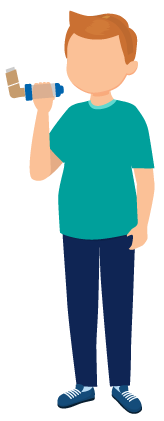Practical support for identifying and meeting need
Physical and sensory
Health needs
Some children and young people have physical health needs which affect their everyday lives, including their time at school.
The support of school staff in meeting these needs makes all the difference, giving children and young people the chance to stay in school, stay well and live their lives.
These physical health needs can occur:
- alongside a special educational need – so that the health need is in addition to, or related to, their learning needs. These children and young people may require an education, health and care plan so that a holistic approach can be taken to meeting their needs.
- in the absence of any learning needs. These are the children and young people who don’t need academic support but do need help in school to overcome the barriers that their health or physical needs present.
Schools’ responsibilities in relation to health and accessibility needs
Some health needs can be met in school quite easily. Through working in partnership with parents and carers and children/young people, appropriate arrangements can be put in place.
The links in the boxes below have more information about the important role that schools play.
Information and advice on how to support children with common health conditions can be found below.
Supporting pupils at school with medical conditions
Healthier Together has further advice for parents and professionals about children’s health issues
Guidance on schools’ responsibilities in relation to accessibility
Accessing support from the wider system
Under construction
A guide to nursing services working with schools
There are a number of different community nursing services that work with school aged children and their families – and provide support and advice to school staff.
0-19 integrated public health nursing service
Who’s in the team?
The team is made up of health visitors, school nurses, children’s nurses and other children’s health workers e.g. dental care advisor, nutritionist, early years practitioners, early attachment workers.
What’s their main purpose?
This service has a real focus on health promotion and early intervention. A lot of their work focuses on pre-schoolers and the delivery of the Healthy Child Programme>.
Their overall aim is to make sure that:
- parents get the right information and support to keep their children safe, healthy and on track with their development
- young people can access the right help and information to stay well, physically and emotionally
- children’s health and developmental needs are picked up at the earliest possible opportunity and that families receive the right advice and signposting to other services when needed.
The 0–19 team are usually the lead nursing team for safeguarding unless a child has complex medical needs.
How they work with schools
This team offers:
- a ‘single point of access’ telephone service so that parents and other professionals can access support and advice – tel: 01709 423333
- partnership working to support vulnerable children with health needs e.g. those on a child protection plan
- drop in sessions for young people at secondary schools
- height and weight checks in school in Reception and year 6
- a follow up service for children identified as overweight through the above checks
- immunisations
- health promotion in schools, including dental care.
Special education nursing team
Who’s in the team?
The team is made up of children’s nurses and health care assistants. They work closely with the paediatricians, children’s therapists and specialist clinical teams.
What’s their main purpose?
This team focuses on children with complex health care needs to make sure that they can safely access education.
What support do they offer?
The team does a lot of work in special schools but also supports children and young people with complex health needs who attend mainstream schools.
They act a point of contact for school and home, will write care plans and run training courses for school staff.
Specialist nurses – for specific conditions
Who are the specialist nurses?
There are specialist nurses for asthma, diabetes and epilepsy. They work as part of specialist teams led by medical consultants.
What’s their main purpose?
When a child’s main health need is one of these conditions, the specialist nurse will be the lead on writing their care plan and liaising with school to ensure staff have the knowledge and skills they need.
Who can access this support?
Specialist nurses tend to work with the children worst affected rather than mild to moderate cases. For example, a child with mild to moderate asthma will get the medical help they need via their GP.
The links below provide more information about training and support when working with children and young people who have complex health needs.



